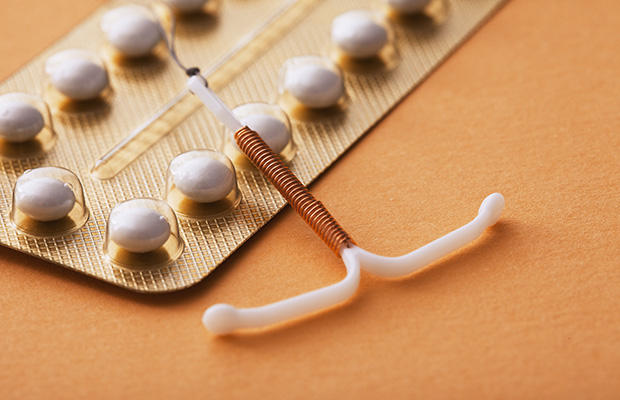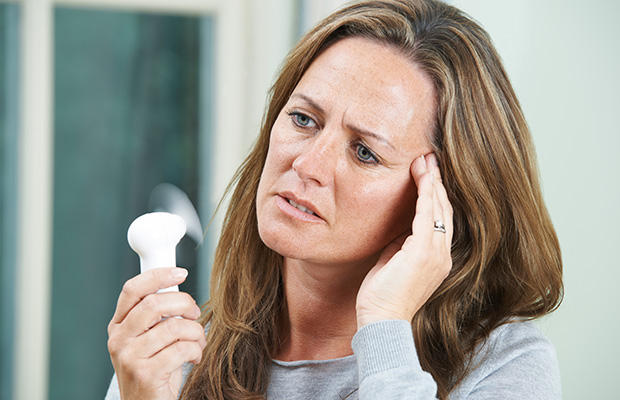 Photograph by Image Point/Shutterstock
Photograph by Image Point/Shutterstock
Several studies have found that progestin-only birth control—including certain birth control pills, the progestin IUD Mirena, and the progesterone implant Implanon—can actually promote weight gain, including a 2013 Cochrane review. Researchers aren't exactly clear on why this is: One theory is that progesterone promotes hunger, so you eat more, says Aronne.
The Fix: Opt for a nonhormonal birth control method such as a copper IUD or condoms. The classic birth control pill, which is a combination of estrogen and progestin, is also an option, since these types of pills don't seem to promote weight gain (but don't take them if you have certain risk factors such as high blood pressure).
The Obstacle: Hormonal fluctuations, especially during perimenopause
When you start going through "the change," which can happen as early as your late 30s, you're not dealing just with hot flashes and mood swings—you may also experience surges in appetite as well. "Your estrogen levels are on a roller coaster ride, and every time they soar, you get a surge in cortisol that increases appetite," explains Pamela Peeke, MD, assistant professor of medicine at the University of Maryland and author of The Hunger Fix. And yes, those hot flashes can cause fitful sleep, which has also been linked to increased weight gain.
The Fix: You can help tamp down hunger hormones by ramping up your exercise routine. Research shows that engaging in 45 minutes of moderate to vigorous activity each morning can make you less interested in food. Getting enough sleep is also key, since sleep deprivation increases the munchies by boosting ghrelin and lowering leptin. Two herbal supplements—isoflavones (found in products like Estovan) and pycnogenol (50 mg daily at bedtime) have been shown to help with insomnia during perimenopause, according to a study published in the medical journal Menopause.
The Obstacle: It's harder to lose belly fat once you hit menopause.
 Photograph by SpeedKingz/Shutterstock
Photograph by SpeedKingz/Shutterstock
During and after menopause, weight tends to settle around the abdomen. "As your ovaries stop producing estrogen, the only place where the hormone can be generated is in your abdominal fat cells," explains Deborah Clegg, PhD, a professor in internal medicine at the Diabetes and Obesity Research Institute at Cedars-Sinai Medical Center in Los Angeles. "So to get estrogen, your body naturally gravitates toward storing fat in that area." But this visceral fat is particularly toxic: It not only produces cortisol and inflammatory proteins known as cytokines, but it also causes your body to churn out more insulin, which ramps up appetite and increases storage of fat in fat cells, causing you to add even more belly weight.
The Fix: Hormone therapy can help if you start it at the correct time. "If you go on HT while you're experiencing symptoms of perimenopause, it can actually protect you from developing this bigger belly," Clegg says. "But if you wait until you've gone through menopause, it's too late to prevent the change in fat storage." If you can't take HT or prefer not to, focus on eating a high-protein, low-glycemic diet—about 30% of your food should come from protein and the rest from low-glycemic foods (ones that don't raise your blood sugar quickly, such as nonstarchy vegetables, nuts, beans and some fruits). "I tell patients to start each meal with vegetables and protein first, and eat their starch last," Aronne says. This pattern significantly reduces your body's blood sugar and insulin levels following a meal, according to a 2015 study that Aronne led.




